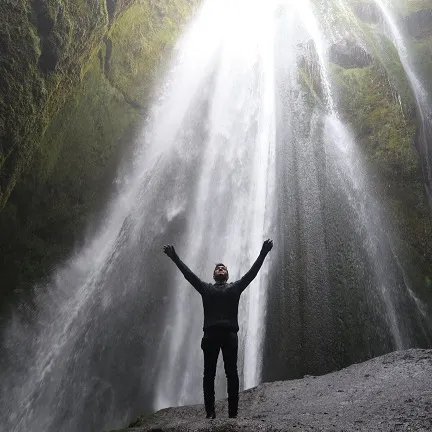Arguably the leader in personal development, Tim Ferriss has written best-selling books on how work smarter, workout better, and even how to become a pro in the kitchen.
And now he just took personal development to a whole new level with his new book, Tools of Titans. After interviewing some of the most successful people in the world on his insanely popular podcast, he composed this book packed full of "the tactics, routines, and habits of billionaires, icons, and world-class performers."
In this article, written by Tim Ferriss, he writes about lessons he's learned regarding mental toughness from "8 Titans."
The article below first appeared on his website, Four Hour Work Week, and you can find it here.
Without further ado, I give you Tim Ferriss's article on how to develop mental toughness...
How to Develop Mental Toughness: Lessons From 8 Titans

"We don't rise to the level of our expectations, we fall to the level of our training." ― Archilochus
Mental toughness can take many forms: resilience against attack, calmness in the face of uncertainty, persistence through pain, or focus amidst chaos.
Below are eight lessons from eight of the toughest human beings I know.
All are taken from the hundreds of tips and tactics in Tools of Titans: The Tactics, Routines, and Habits of Billionaires, Icons, and World-Class Performers.
#1 - IF YOU WANT TO BE TOUGHER, BE TOUGHER
-Jocko Willink, former Navy SEAL Commander
“If you want to be tougher mentally, it is simple: Be tougher. Don’t meditate on it.”
TIM: These words of Jocko's helped one listener—a drug addict—get sober after many failed attempts. The simple logic struck a chord: “Being tougher” was, more than anything, a decision to be tougher. It’s possible to immediately “be tougher,” starting with your next decision.
Have trouble saying “no” to dessert? Be tougher. Make that your starting decision.
Feeling winded? Take the stairs anyway. Ditto.
It doesn’t matter how small or big you start. If you want to be tougher, be tougher.
#2. I WASN’T THERE TO COMPETE. I WAS THERE TO WIN
TIM: In my interview with Arnold, I brought up a photo of him at age 19, just before he won his first big competition, Junior Mr. Europe. I asked, “Your face was so confident compared to every other competitor. Where did that confidence come from?” He replied:
“My confidence came from my vision. . . . I am a big believer that if you have a very clear vision of where you want to go, then the rest of it is much easier. Because you always know why you are training 5 hours a day, you always know why you are pushing and going through the pain barrier, and why you have to eat more, and why you have to struggle more, and why you have to be more disciplined... I felt that I could win it, and that was what I was there for. I wasn’t there to compete. I was there to win.”
#3 - PUSH BEYOND, SHARE PRIVATION, TACKLE FEAR
-4-Star General Stanley McChrystal
TIM: The following from Gen. McChyrstal was in response to “What are three tests or practices from the military that civilians could use to help develop mental toughness?”:
“The first is to push yourself harder than you believe you’re capable of. You’ll find new depth inside yourself. The second is to put yourself in groups who share difficulties, discomfort. We used to call it ‘shared privation.’ [Definition of privation: a state in which things essential for human well-being such as food and warmth are scarce or lacking.] You’ll find that when you have been through that kind of difficult environment, you feel more strongly about that which you’re committed to. And finally, create some fear and make individuals overcome it.”
#4 - PUT FEAR IN LINE
-Caroline Paul, luger, firefighter, and more
TIM: In the 1990s, Caroline illegally climbed the Golden Gate Bridge, rising to ~760 feet on thin cables. She’d mentioned “putting fear in line” to me, and I asked her to dig into the specifics.
“I am not against fear. I think fear is definitely important. It’s there to keep us safe. But I do feel like some people give it too much priority. It’s one of the many things that we use to assess a situation. I am pro-bravery. That’s my paradigm.
Fear is just one of many things that are going on. For instance, when we climbed the bridge, which was five of us deciding we wanted to walk up that cable in the middle of the night. Please don’t do that, but we did. Talk about fear—you’re walking on a cable where you have to put one foot in front of the other until you’re basically as high as a 70-story building with nothing below you and . . . two thin wires on either side.
It’s just a walk, technically. Really, nothing’s going to happen unless some earthquake or catastrophic gust of wind hits. You’re going to be fine as long as you keep your mental state intact. In those situations, I look at all the emotions I’m feeling, which are anticipation, exhilaration, focus, confidence, fun, and fear. Then I take fear and say, ‘Well, how much priority am I going to give this? I really want to do this.’ I put it where it belongs. It’s like brick laying or making a stone wall. You fit the pieces together.”
#5 - IS THAT A DREAM OR A GOAL?
-Paul Levesque/Triple H, WWE superstar and executive
“[Evander Holyfield] said that his coach at one point told him, something like his very first day, ‘You could be the next Muhammad Ali. Do you wanna do that?’ Evander said he had to ask his mom. He went home, he came back and said, ‘I wanna do that.’ The coach said, ‘Okay. Is that a dream or a goal? Because there’s a difference.’ “I’d never heard it said that way, but it stuck with me. So much so that I’ve said it to my kid now: ‘Is that a dream, or a goal? Because a dream is something you fantasize about that will probably never happen. A goal is something you set a plan for, work toward, and achieve. I always looked at my stuff that way. The people who were successful models to me were people who had structured goals and then put a plan in place to get to those things. I think that’s what impressed me about Arnold [Schwarzenegger]. It’s what impressed me about my father-in-law [Vince McMahon].”
#6 - PAIN TOLERANCE CAN BE THE FORCE MULTIPLIER
Amelia Boone, 3x World's Toughest Mudder champion
“I’m not the strongest. I’m not the fastest. But I’m really good at suffering.”
#7 - WHO DO YOU SURROUND YOURSELF WITH WHEN YOUR EGO FEELS THREATENED?
Josh Waitzkin, chess prodigy, push hands world champion, first black belt under BJJ phenom Marcelo Garcia
Back in the world of combat sports and Brazilian jiu-jitsu:
“It’s very interesting to observe who the top competitors pick out when they’re five rounds into the sparring sessions and they’re completely gassed. The ones who are on the steepest growth curve look for the hardest guy there—the one who might beat them up—while others look for someone they can take a break on.”
#8 - THE MAGIC OF THE SINGLE DECISION
Christopher Sommer, former men's gymnastics national team coach
TIM: We all get frustrated. I am particularly prone to frustration when I see little or no progress after several weeks of practicing something new. Despite Coach Sommer's regular reminders about connective-tissue adaptations taking 200 to 210 days, after a few weeks of flailing with “straddle L extensions,” I was at my wits’ end. Even after the third workout, I had renamed them “frog spaz” in my workout journal because that’s what I resembled while doing them: a frog being electrocuted.
Each week, I sent Coach Sommer videos of my workouts via Dropbox. In my accompanying notes at one point, I expressed how discouraging it was to make zero tangible progress with this exercise. Below is his email response, which I immediately saved to Evernote to review often.
It’s all great, but I’ve bolded my favorite part.
“Dealing with the temporary frustration of not making progress is an integral part of the path towards excellence. In fact, it is essential and something that every single elite athlete has had to learn to deal with. If the pursuit of excellence was easy, everyone would do it. In fact, this impatience in dealing with frustration is the primary reason that most people fail to achieve their goals. Unreasonable expectations time-wise, resulting in unnecessary frustration, due to a perceived feeling of failure. Achieving the extraordinary is not a linear process.
The secret is to show up, do the work, and go home.
A blue collar work ethic married to indomitable will. It is literally that simple. Nothing interferes. Nothing can sway you from your purpose. Once the decision is made, simply refuse to budge.
Refuse to compromise.
And accept that quality long-term results require quality long-term focus. No emotion. No drama. No beating yourself up over small bumps in the road. Learn to enjoy and appreciate the process. This is especially important because you are going to spend far more time on the actual journey than with those all too brief moments of triumph at the end.
Certainly celebrate the moments of triumph when they occur. More importantly, learn from defeats when they happen. In fact, if you are not encountering defeat on a fairly regular basis, you are not trying hard enough. And absolutely refuse to accept less than your best.
Throw out a timeline. It will take what it takes.
If the commitment is to a long-term goal and not to a series of smaller intermediate goals, then only one decision needs to be made and adhered to. Clear, simple, straightforward. Much easier to maintain than having to make small decision after small decision to stay the course when dealing with each step along the way. This provides far too many opportunities to inadvertently drift from your chosen goal. The single decision is one of the most powerful tools in the toolbox.”
-Tim Ferriss




.avif)


























